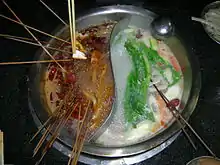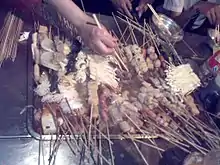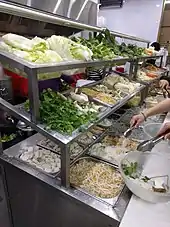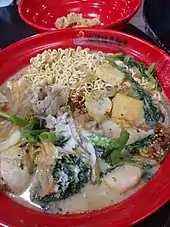Malatang
Malatang (simplified Chinese: 麻辣烫; traditional Chinese: 麻辣燙; pinyin: málàtàng; lit. 'spicy numbing hot [soup]') is a common type of Chinese street food.[1] It originated in Sichuan, but it differs mainly from the Sichuanese version in that the Sichuanese version is more similar to what in northern China would be described as hot pot.
| Malatang | |||||||||||||
|---|---|---|---|---|---|---|---|---|---|---|---|---|---|
 | |||||||||||||
| Traditional Chinese | 麻辣燙 | ||||||||||||
| Simplified Chinese | 麻辣烫 | ||||||||||||
| Literal meaning | spicy numbing hot | ||||||||||||
| |||||||||||||
On June 20, 2017, the Chinese General Department of Quality Supervision, Inspection and Quarantine and the National Standards Management Committee jointly issued a series of national standards for "English Translation and Writing Standards." in Public Services ". The standard name for the noun Malatang into English is "Spicy Hot Pot" officially launched on December 1, 2017,[2] but despite this stance, the term "malatang" has entered English as a loanword.[3][4]
Origin
Malatang is named after its key ingredient, mala sauce, which is flavored with a combination of Sichuan pepper and dried chilli pepper. The word málà is composed of the Chinese characters for "numbing" (麻) and "spicy (hot)" (辣), referring to the feeling in the mouth after eating the sauce.
Malatang is said to originate from the Yangtze River near Sichuan. In ancient times, boating was a big industry and many people made a living by towing boats. Working under the damp and foggy weather made boat trackers feel very sick. And when they were hungry, they cooked herbs in a pot and put Sichuan pepper and ginger into the soup to eliminate dampness. Malatang was created, then vendors discovered the business opportunity, and spread it throughout China.
Unlike hot pot, which is made to order and shared only by diners at a table, malatang originates from street food cooked in a communal pot. Diners can quickly choose what they wish to eat, and either eat on the spot or take away.
Preparation
Skewers

Typically a table with a big and flat saucepan is set up on the street, with a large number of ingredients in skewers being cooked in a mildly spicy broth. Customers sit around the table pick up whatever they want to eat. Given the large number of ingredients available, normally not all ingredients are in the saucepan at the same time, and customers may suggest what is missing and should be added.
All skewers normally cost the same. In Beijing as of June 2012 they cost one RMB each. Customers keep the used wooden sticks by their plates, and when a customer finishes eating, the price to pay is determined by counting the number of empty sticks.
By weight


In the mid-2010s malatang shops became popular in North China, especially Beijing. In these shops the ingredients are usually displayed on shelves, and customers pick their desired ingredients into a bowl. Behind the counter the selected ingredients are cooked in a spicy broth, usually at very high temperature for 3–4 minutes. Before serving, malatang is typically further seasoned with much garlic, black pepper, Sichuan pepper, chili pepper, sesame paste, and crushed peanuts. The price is calculated based on the weight of the self-picked ingredients. In Beijing, half a kilogram usually costs between 15-20 RMB as of November 2015.
Common ingredients
Some of the common ingredients include:[5]
- wosun (celtuce)
- beef (chunks)
- dumplings
- fish balls
- lettuce
- spinach
- other mixed greens
- lotus root
- mushrooms
- fresh and instant noodles
- pork liver
- pork lung
- potato
- quail eggs
- Spam
- Chinese yam
- sheep intestines
- numerous types of dried and frozen tofu
- nian gao rice cakes
- beef balls
- fish balls
- chicken balls
- sweet potato
- tripe
References
- Kraig, B.; Sen, C.T. (2013). Street Food Around the World: An Encyclopedia of Food and Culture. ABC-CLIO. p. 93. ISBN 978-1-59884-955-4. Retrieved July 17, 2017.
- "Knowledge-How to translate spicy hot, rice noodles, ramen, barbecue? There is a national standard". The Paper.cn. June 21, 2017. Retrieved June 6, 2020.
- "Wiktionary: Malatang". English Wiktionary.
- "Wikipedia: Malatang (this article)". English Wikipedia.
- "麻辣烫的做法_麻辣烫怎么做_麻辣烫的家常做法【图文】_火锅食谱菜谱".
External links
 The dictionary definition of malatang at Wiktionary
The dictionary definition of malatang at Wiktionary
